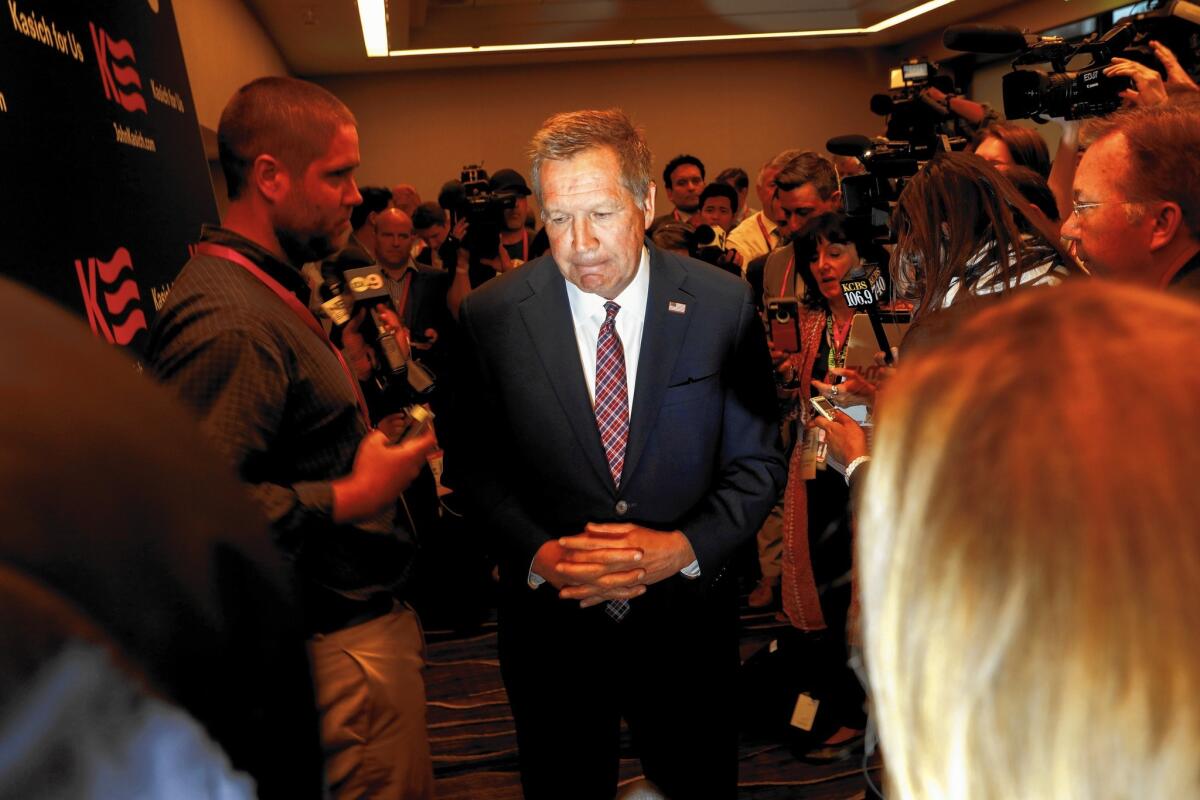Sorry, Trump, Cruz and Kasich: These high-profile Republicans are just not that into you

When New York held its recent presidential primary, Rep. Peter T. King was quite specific about his sentiments: He cast his ballot for Ohio Gov. John Kasich, but that didnât mean he was endorsing his candidacy.
âIf I thought that John Kasich had a viable chance, Iâd come out and endorse him,â the Republican lawmaker said on MSNBC, in effect tossing a bouquet of wilted flowers at the struggling White House hopeful.
If Kasich felt chastened, or confused, he was not alone. That odd linguistic formulation has been heard throughout this fraught election season, introducing a new dodge into the lexicon of tortured political locution.
Sens. Jim Risch of Idaho and Ben Sasse of Nebraska said they voted for their fellow Republican senator, Texan Ted Cruz, for president, but each avoided using the E-word.
Nevadaâs GOP Gov. Brian Sandoval caucused for Sen. Marco Rubio of Florida when he was still in the Republican race, but nope, Sandoval insisted, that didnât constitute an endorsement. Ditto for Rudolph W. Giuliani, who said he was voting for â but not endorsing â Donald Trump.
âWhen I endorse somebody, I join their campaign,â the former New York mayor said on CNN, offering his own particular meaning. (The verb âendorseâ is conventionally defined as âto declare oneâs approval or support of.â)
âIâm not joining the campaign in any way,â Giuliani said.
Veteran campaign hands, like Rich Galen, can recall nothing like it.
âThe strongest endorsement you can give is to vote for someone,â said Galen, a Republican communications strategist whose political resume includes stints with then-Indiana Sen. Dan Quayle and former House Speaker Newt Gingrich. âTo say youâre voting for someone but not endorsing them is a political oxymoron.â
Ken Khachigian, a former presidential speechwriter, agreed. âIt doesnât make any sense,â he said. âA vote is an expression of advocacy, especially in a primary. You have a choice and so youâre, in effect, endorsing.â
To Khachigian, who helped polish phrases for President Reagan, the verbal contortion suggests a have-it-both-ways lack of courage and political conviction. âItâs what people are rebelling against this political season,â he said.
On Friday, it was Indiana Gov. Mike Pence knotting himself up with a not-quite endorsement of Cruz. He heaped praise on Trump, said he would vote for Cruz in Tuesdayâs crucial primary in Indiana, then, as if to further muddle his intent, urged all Hoosiers âto make up their own minds.â
But where some see evasion, others see perfect reason.
âItâs not oxymoronic in the least,â said Steven Pinker, a Harvard University psychology professor and semantics expert. âPeople vote for two reasons: to affect the outcome of the election and to express their beliefs.
âItâs unlikely that any candidate will represent oneâs beliefs exactly,â Pinker said, âbut if one still strongly prefers the outcome of one candidate being elected rather than another, one could very well vote for the âacceptable,â âbetter of the two,â âleast bad,â âlesser of two evilsâ or âanyone but himâ candidate.â
For many Republicans, that would certainly apply to the case here. They see an unhappy choice between Cruz and the front-running Trump that Sen. Lindsey Graham of South Carolina likened to picking between being shot or poisoned. He subsequently endorsed Cruz, without terrific enthusiasm.
Given efforts to thwart Trump at the GOP convention this summer, critics such as party strategist Stuart Stevens said it was not unreasonable to support a candidate now in hopes of undermining the Manhattan business mogul, with the intention of backing someone else later.
âIt reflects the reality of the system,â said Stevens, who helped guide Mitt Romney to the 2012 GOP nomination.
Romney, who briefly considered another try this year for the White House, parsed his preferences in two states. He voted for Cruz in Utah but made clear he was not endorsing the senator. Just a week earlier, Romney had urged Ohio voters to back their governor â again, sans endorsement.
âPrimaries are the process of picking the best available choice,â Stevens said. Itâs entirely possible, he said, to vote for a candidate and later support someone else, given the opportunity.
King suggested as much in his equivocal support for Kasich. âI want to keep my powder dry,â he said, âbecause this might go to the convention.â
Eyes clear, options open. Itâs a stance most politicians would heartily endorse.
Twitter: @markzbarabak
MORE POLITICAL COVERAGE
Rising confidence in Californiaâs economy is a challenge for GOP presidential candidates
Gov. Jerry Brown: âSomething strangeâ is fueling the rise of Donald Trump
Whoâs winning the race to the nomination?
More to Read
Get the L.A. Times Politics newsletter
Deeply reported insights into legislation, politics and policy from Sacramento, Washington and beyond. In your inbox three times per week.
You may occasionally receive promotional content from the Los Angeles Times.











